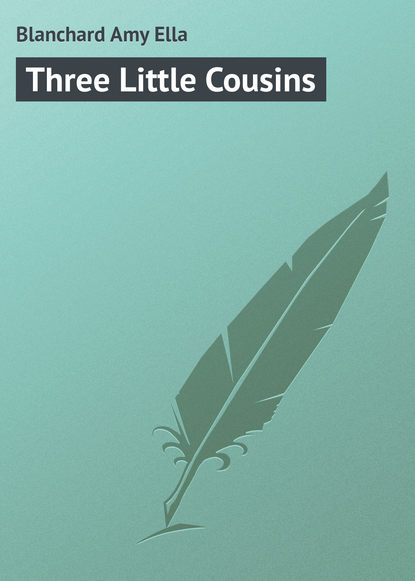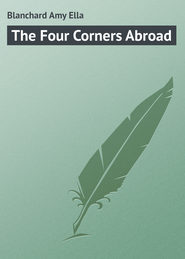По всем вопросам обращайтесь на: info@litportal.ru
(©) 2003-2024.
✖
Three Little Cousins
Настройки чтения
Размер шрифта
Высота строк
Поля
"Yes, I am except for one thing; I know I shall be scared to death of Miss Sharp. Is she really so very, very strict?"
"My word! but you'd think so. Fancy never being allowed to run, nor to climb nor to do anything one really likes to do, and, oh, Molly, I wonder will you eat your meals in the nursery with us children. There's nasty rice pudding twice a week, you know, and there are never hot rolls nor biscuits for breakfast as you have here, then we do have horribly cold houses in winter."
"Oh!" Molly looked quite disturbed by this report. But presently her face again broke into smiles. "But then, to see England and to be with you, Mary. We shall go up to London in the spring and we shall spend the winter in Cornwall or Devon, where it is not so very cold, mother says."
"Oh, we are to be in the country, then," said Mary. "I'm glad of that. Papa thought we should take our country home again this winter; we were not there last year."
"It's so funny to go to the country for winter and the city for summer," remarked Polly. "We do just the opposite."
"Oh, but we like the country in winter," Mary explained. "It's jolly good sport to be there then. We have a proper little pony of our own, you know, and we really have quite good times." Polly laughed. "It is so funny to hear Mary say a 'proper' pony. We would say a real pony, wouldn't we?"
"I shall be corrected a great many times for the American things I have learned to say," said Mary. "I've no doubt but that Miss Sharp will be continually coming down on me for saying them. She is a sharp one, true enough. I'll have to watch myself."
"She needn't try to correct me," Molly put in.
"Oh, but you are an American," Mary hastened to reassure her, "and you'll do just as your mother bids you, of course."
This relieved the situation for Molly. The prospect of frequent drives behind the "proper little pony," and the pleasure of a real English Christmas, which Mary had described in glowing colors, cheered her up, and she stated that she thought she could stand Miss Sharp as long as her own mother would always be on hand to refer to.
As the three were talking it all over, Uncle Dick appeared at the door. "Well, Mollykins," he said, "how do you like your news?"
"Oh, do you know it, too?" she said, running up to him. "I like it very much, but I wish you and Aunt Ada and Polly were going, too."
"That would be too many at once," he returned. "Go in and see your Aunt Ada; she has something to tell you."
"Who is it about?" asked Molly.
Uncle Dick walked down the porch steps. "It concerns me very much," he said over his shoulder.
"Concerns him? Do you suppose he is going to England, too?" said Mary.
"Let's go and find out," returned Molly. And the three ran indoors to where Miss Ada sat.
"Well, kitties," she said as they came in, "there is a lot of news to-day, isn't there?"
"Yes, isn't it fine that mother and I are going to England? That is what you meant, isn't it?"
"Not all."
"Uncle Dick said you had something to tell us," said Polly.
"So I have. It concerns Polly more than any of you, though it might concern Molly if she were not going abroad."
"That sounds like a puzzle," laughed Polly. "But Uncle Dick said it concerned him."
"The silly boy!" Miss Ada drew down the corners of her mouth. "No doubt he'll make it his concern. Why Polly, it is this: Mr. Perkins, your tutor, has had a good offer in Denver and as he is so well and strong now he thinks he must accept it, and as Walter is old enough to go away to school, your father and mother thought a man was not needed to teach you and the others, so you are to have a new teacher. Guess who it is to be?"
"Oh, I can't. Tell me." Polly was all eagerness.
"Miss Ainslee."
"Not my Miss Ainslee?" cried Molly in surprise.
"Your Miss Ainslee."
"Oh, I'm jealous," said Molly. "Oh, Polly, to think you will have her all to yourself. Oh, dear!"
"But you will not be here, honey," said her aunt, "and besides it is better for Miss Ainslee that she should go, for the doctor thinks she cannot get along in the east, and that she must either stop teaching or go to another climate. She isn't ill exactly, but it is better that she should not wait till she is. So you see – "
"Oh, I see, but I am sorry all the same," said Molly dolefully.
"And I am tremendously glad," said Polly. "I liked Mr. Perkins very well, but Miss Ainslee is such an improvement on him. Is she to go out with us, Aunt Ada?"
"Yes."
"Then that is what Uncle Dick meant when he said it concerned him. He was thinking how nice it would be to travel all that way with her."
"He's looking further than that," remarked Miss Ada with a smile. "If things keep on this way I don't believe she will ever come east again to live, Polly."
"She won't if I can help it," said Uncle Dick from the doorway. "What do you think of our scheme, Pollywog?" he asked as he caught Polly and tousled her.
"I think it is grandiferous," replied Polly, squirming out of his grasp. "But you'd better behave yourself, Mr. Dicky-Pig, or I'll tell on you."
"Just see how she gets me in her power," said Uncle Dick to his sister. "I'll not be safe a moment from that wicked child's malicious tales."
"Don't you call me a wicked child," said Polly darting at him. "Now for your nose."
"Spare me! Spare me!" cried her uncle, putting up both hands. "I'll be good, Polly; I will indeed, but if you spoil my features, how can you expect Miss Ainslee ever to like me? If you'll promise to be good and say nice things about your dear uncle, I'll let you be bridesmaid."
"Oh, Dick, you silly boy!" expostulated his sister. "Don't fill the child's head with such notions. He hardly knows Miss Ainslee, Polly, and it will make her so uncomfortable that she will leave, in a month, if your Uncle Dick keeps up this sort of nonsense."
This hushed up Master Dick and he began to ask Polly such silly questions as: "What is the result of half a dozen ears of corn and a pint of Lima beans?"
"You can't add ears and pints," protested Polly stoutly.
"Oh, yes, you can," returned her uncle jauntily. "Luella does it often and the result is succotash."
Polly made a contemptuous mouth at him.
He laughed and went on. "Here's another. When apples are ten cents a quart how much are blueberries?"
"Why, why – they're just the same. Aren't they?" Polly appealed to her Aunt Ada.
"The blueberries are less; they're always less; they're smaller, you see," her uncle answered.
"That's no answer at all," said Polly in a disgusted tone. "I won't play," and she stalked off to join her cousins.
Yet, as the poet Burns says: "The best laid plans of mice and men gang aft agley," and, after all, things did not turn out exactly as was at first expected; for when the children had made their rounds to say good bye to Ellis and Myrtle, Leona, Ora and the rest, and when they were actually on the boat with Cooney safe in a big basket, Uncle Dick pulled some letters out of his pocket and began to look them over. "I found these in our box this morning when I went into the post-office," he said. "There's one for you, Ada, and here's one for me from Arthur." He glanced down the page. "Well, well, well," he exclaimed, "this settles your hash, Miss Molly."











